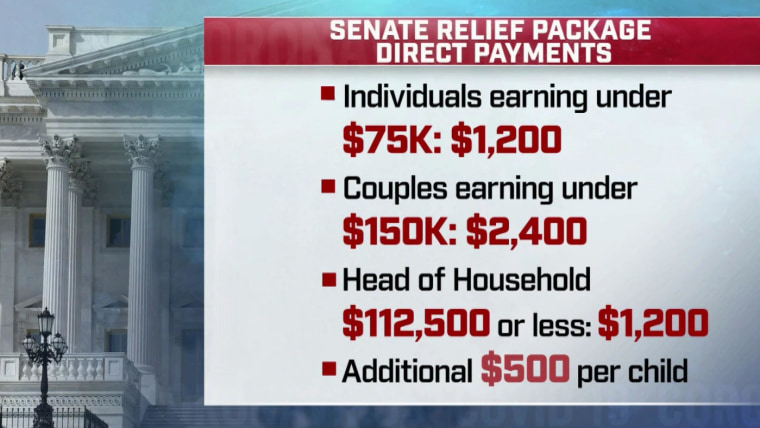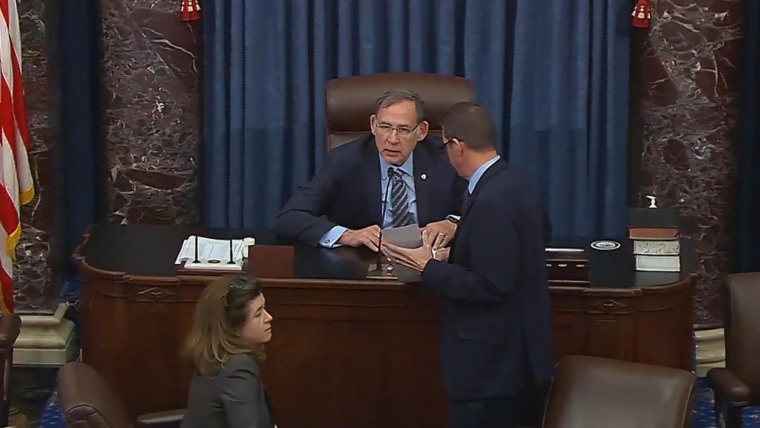WASHINGTON — As the coronavirus crisis ravages the U.S. economy, millions of Americans are urgently awaiting financial help from Congress in the form of direct cash payments.
Congressional leaders and President Donald Trump announced a bipartisan deal Wednesday on a massive $2 trillion emergency economic package that includes direct cash payments to people across the country to help them through the crisis. The Senate passed the bill 96 to 0, and the House is expected to follow suit on Friday.
But who’s eligible to get a check, and for how much? Here are some questions and answers about who qualifies for cash from the federal government:
Q: How much will I get?
Depends on how much you make.
If you made less than $75,000 in 2019, you will be eligible for the full payment of $1,200. Couples who filed jointly and made less than $150,000 will get $2,400. An individual who filed as “head of household” and earned $112,500 or less gets $1,200.
For every child in the household, you will receive an additional $500.
Follow along here for live updates on the Coronavirus Pandemic.
If you made more than $75,000, your payment will be reduced by $5 for every $100 of income that exceeds the limits. So if you made $80,000 in 2019, you will receive $950. The payment decreases to zero for an individual making $99,000 or more or a couple making $198,000 or more.
If you’re a family of four, you’ll be eligible for a maximum of $3,400.
Q: When is the money coming?
Treasury Secretary Steven Mnuchin said Wednesday the checks will be sent out “within three weeks” to people for whom the IRS has information. You don’t need to sign up or fill out a form to receive a payment if you’ve been working and paying taxes since 2018.
The Treasury Department will also run a “public awareness campaign” with information about the program, including for people who didn’t file a tax return for 2018 or 2019.
Q: Will there be multiple payments?
No, this legislation only authorizes one-time payments. But House Speaker Nancy Pelosi suggested on CNN that Congress could revisit the issue: “We think we’ll get more direct payments in another bill.”
Let our news meet your inbox. The news and stories that matters, delivered weekday mornings.
Q: Where do I sign up?
You don’t. There’s no sign up. The payments will be automatic for people who have filed a tax return or gotten Social Security benefits recently. The IRS asks people not to call with questions, but to keep checking this website where they will post updates about the program once they are available.
Q: How will the money be sent?
If you’ve gotten a tax refund in the last two years by direct deposit, that’s where the money will be sent. If not, the IRS can mail a check to your “last known address,” and it has 15 days to notify you of the method and amount of the payment. They’ll send a phone number and appropriate point of contact so you can tell them if you didn’t receive it.
If you’ve moved recently, it may be a good idea to notify the IRS as soon as possible. The IRS also suggests that if you haven’t yet filed a tax return for 2018 or 2019, do it as soon as you can, so that the government has your up-to-date information on file.
Q: How does the gov’t calculate how much I earned?
Have you filed your taxes for 2019 already? If so, the checks will automatically be based on your 2019 return. Look for your “adjusted gross income” (Line 7 on your Form 1040 tax return in 2018, or line 8B on a 2019 return.) If you haven’t filed your 2019 taxes yet, it’ll be based on your 2018 return.
Q: I’m on Social Security, or don’t make enough to file a tax return. Will I get a check?
Yes. Even if you didn’t file a tax return for 2018 or 2019 or pay taxes in those years, you will be eligible if you received a Form SSA-1099 for the year 2019. That’s a form that the Social Security Administration sends each year to people who receive Social Security benefits, including retirement and disability.
Q: I’m a disabled vet but don’t pay taxes. Do I qualify?
Yes, although some of the details still need to be worked out. The IRS is expected to set up a system so that disabled veterans don’t fall through the cracks.
Q: I’m a college student. Do I get a check?
If your parents claim you as a dependent on their taxes, you’re ineligible. But if you’ve been working and filing taxes independently in recent years, you may qualify.
Q: I made too much money in 2019 to qualify. But now I’ve been laid off. Am I out of luck?
Not necessarily, but you’ll have to wait.
If you made too much to qualify in your last tax filing, you probably won’t be eligible for the cash benefit immediately. But you can apply for it when you file your 2020 tax return if your income drops below below $99,000 threshold for individuals (which doubles for couples) this year.
The IRS is expected to create a system to ensure help for people who fall into this category.
Q: I’m not an American citizen. Do I qualify?
Yes — as long as you’re living and working in the U.S. with a valid Social Security number. That includes green card holders, and it generally includes those on work visas, such as an H-1B and H-2A. But it generally excludes visitors and people who are in the U.S. illegally.
Q: Are the cash payments taxable?
Nope.
Q: I live in Puerto Rico or another U.S. territory. Is that a problem?
Not at all. There’s a special provision ensuring that people living in U.S. territories, even ones that have a different tax system, are still eligible.
Q: What if I’m homeless or recently got out of prison? Will I get help?
As long as you have a Social Security number, you should be eligible to apply for the relief payments under the new system created by the IRS.
The bill doesn’t exclude you from getting a payment if you owe past due taxes. That said, the IRS has yet to set up the new system.















